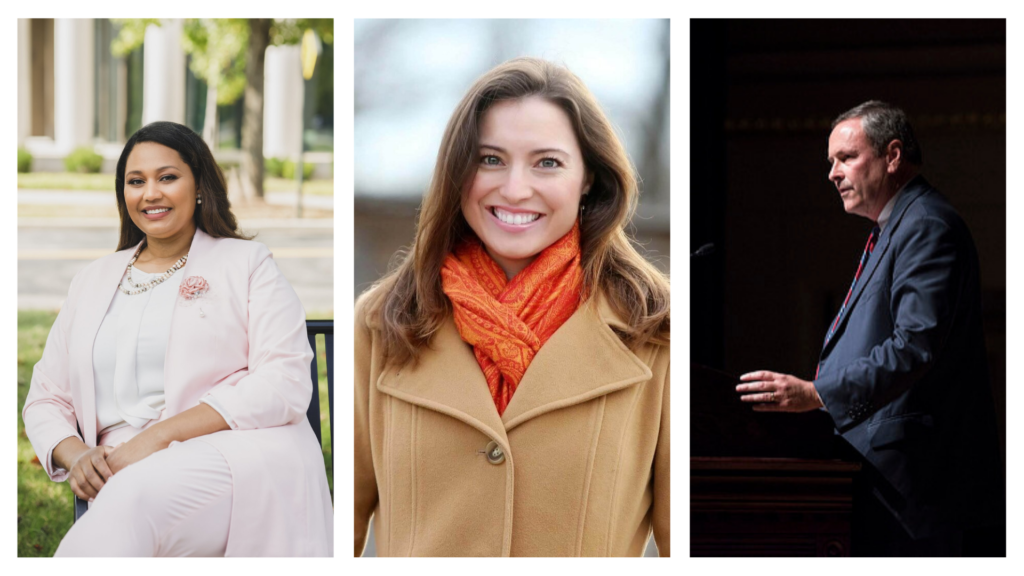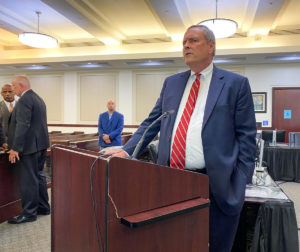
Equity. Healing. Restorative justice. These are some of the buzzwords at the center of the Davidson County district attorney’s race.
With the primary election just over one month away, the Democratic candidates for DA are all advertising themselves as progressive reformers. In many ways, their campaign platforms echo one another. They want fewer people behind bars, and they want the system to be fair — regardless of your race or income.
But the candidates disagree on the details. Here’s what you need to know about the three people vying for top prosecutor.
P. Danielle Nellis
Nellis hopes to address the root issues causing violence and to build stronger relationships between the DA’s office and the community. She has worked as both a prosecutor and defense attorney and says her goal is to foster healing for both victims and perpetrators of crime.
“Criminal justice reform and public safety are my goals, and they are necessary to build a safer and stronger Nashville,” she said at a forum with Nashville Organized for Action and Hope on Sunday.
Nellis has released an 18-page policy book, which outlines the steps she would take to increase transparency, prevent crime, expand restorative justice and work more closely with residents. Those steps include:
- Gather and analyze data through an audit to look for patterns and potential biases in the criminal justice system
- Diversity, equity and inclusion training for prosecutors
- Community engagement, including holding office hours and attending neighborhood meetings
- Prosecute human traffickers
- Divert people out of jail or prison when possible through mental healthcare, substance use treatment and restorative justice
- Create “Neighborhood Courts,” where trained community members decide how people accused of non-violent misdemeanors can repair the harm they have caused without going to jail
- Expand pre-trial services to detain fewer people before they have been found guilty of a crime
- Make the scheduling system for court dates more efficient
Sara Beth Myers
Myers is focused on data. Like Nellis, she wants an audit, to see if certain groups or neighborhoods are being disproportionately targeted by the criminal justice system. She also wants to adopt a precinct model, like the police department, which would assign assistant district attorneys to specific neighborhoods.
Myers has spent most of her career as a prosecutor — in the local district attorney’s office, in the state attorney general’s office and in the federal Department of Justice. But she has also highlighted flaws in the system she hopes to remedy as DA.
“If you want real criminal justice reform and not just a tip of the hat or rhetoric surrounding criminal justice reform, but you want results, that is me,” she said in the NOAH forum.
On her campaign website, Myers says her main priorities are crime prevention, civil rights and restorative justice. Here’s how she says she’ll tackle them:
- Conduct a precinct-specific audit to uncover trends affecting different parts of the county
- Hold quarterly public meetings in each precinct
- Focus on crimes that put people in “imminent danger”: gun violence, domestic violence, sexual assault, crimes against children, human trafficking and opioids
- Train prosecutors and law enforcement to reduce bias and police violence
- Create a restorative justice unit for nonviolent crimes
- Model the local pre-trial release program on the federal system, which determines whether someone can go home based on their risk of danger or flight
- Make the conviction review unit independent from the rest of the DA’s office, so fellow prosecutors aren’t assessing their colleagues’ past cases
Glenn Funk
The incumbent says he’s already made a lot of changes in the past eight years, and he wants to continue on the same path.
 Samantha Max WPLN News
Samantha Max WPLN NewsGlenn Funk tells reporters that the prosecution of Metro Nashville Police Department Officer Andrew Delke was “not a slam dunk case” after a hearing July 2, 2021. Funk offered Delke a plea deal for voluntary manslaughter and a three-year sentence in the local jail.
At the NOAH forum, Glenn Funk noted the partnerships he has built with judges, the public defender and the sheriff to divert people from jail. He also noted that he has stopped prosecuting some low-level crimes and has increased diversity within his office — a promise he made on the campaign trail last time around.
“Justice is not a choice between public safety and fairness,” Funk said. “Justice is boldly demanding both.”
Here are some highlights from Funk’s past eight years as top prosecutor:
- Brought the first murder indictment against a Nashville police officer for an on-duty shooting. However, after years of delays, Funk offered the officer a last-minute plea deal for a lesser charge, which resulted in a three-year jail sentence with the chance for release after about a year-and-a-half. The family of Daniel Hambrick, who was killed by then-Officer Andrew Delke, criticized Funk for making the deal. Hambrick’s mother called it a “backroom bargain.”
- Has also not announced criminal charges in any of last year’s 10 shootings by Nashville police or a shooting on the interstate this January
More: Learn about the plea deal in the Epilogue of the Deadly Force podcast.
- Created a program to help people restore their driver’s licenses instead of being prosecuted for not paying fines related to driver’s license violations
- Worked with different criminal justice agencies to decrease the local jail population from more than 3,100 people a day in 2013 to approximately 1,500 today (according to the district attorney’s website)
- Raised alarms about the potential cost of body cameras for police officers and ripple effects on the day-to-day operations of the criminal justice system amid mounting calls for the technology after years of delays
- Stopped prosecuting marijuana possession of less than half an ounce
- Offered a deal to exchange the death sentence of Abu-Ali Abdur’Rahman for life in prison, citing racial bias at his trial. The state challenged the deal in court, but a judge worked out a new agreement to remove Abdur’Rahman from death row last fall.
- Declined to enforce a Tennessee law that restricts people’s rights to abortion
- Prosecuted several high-profile cases, including the Waffle House shooter and a former Vanderbilt nurse whose medical error caused a patient’s death
Election day is May 3. Early voting begins April 13.

